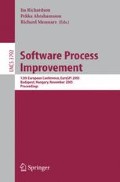Abstract
The purpose of this research is to investigate the meaningfulness to develop process improvement support at an individual level for soft factors in software development. Soft factors are non-technical activities that are hard to measure which is problematic when developing support for these activities, as improvements are achieved by collecting and analyzing process data. The Business Process Analyst, BPA, works mainly with soft factors in software development projects. The BPA leads and coordinates analysis and modelling of businesses. The BPA was chosen to receive support for improving soft factors. The support was provided in form of a framework for collecting and analyzing qualitative data. The framework is based on interviews and assessments with BPAs from industry. The results indicate that soft factors at an individual level can be supported in software development. This is positive since more roles than the BPA work with soft factors and thus may receive support.
Access this chapter
Tax calculation will be finalised at checkout
Purchases are for personal use only
Preview
Unable to display preview. Download preview PDF.
References
Gilbert, S.: Wearing Two Hats: Analyst-Managers for Small Software Projects. IT Professional, 34–39 (July/August 2004)
Chakrapani, C.: How to Measure Service Quality & Customer Satisfaction. Technical report (1988) ISBN 0-87757-267-4
Johansson, S.: Verksamhetsbedömning i mjuka organisationer. Department of Business Administration, Gothenburg University (1992) (in Swedish)
Wohlin, C., Runeson, P., Höst, M., Ohlsson, M., Regnell, B., Wesslèn, A.: Experimentation in Software Engineering – An Introduction. Lund University (2000)
Humphrey, W.S.: A Discipline for Software Engineering. Addison-Wesley Publishing Company, Reading (1997)
Humphrey, W.S.: Introduction to the Team Software Process. Addison-Wesley Publishing Company, Reading (2000)
Fenton, N.E., Pfleeger, S.L.: Software Metrics: A Rigorous and Practical Approach, 2nd edn. International Thomson Publishing Inc. (1997)
DeMarco, T.: Software Metrics: Controlling Software Projects. Yourden Press (1982)
Lantz, A.: Interjumetodik - Den professionellt genomförda intervjun. Studentlitteratur (1993) (in Swedish)
Lientz, B.P., Rea, K.P.: Professional’s Guide to Process Improvement – Maximizing Profit, Efficiency, and Growth. Harcourt Professional Publishing (2001)
Masaaki, I.: Kaizen - the Key to Japan’s Competitive Success. Random House Trade (1986)
Tague, N.R.: The Quality Toolbox, 2nd edn. ASQ Quality Press (2004)
Humphrey, W.S., Khajenoori, S., Macke, S., Matvya, A.: Results of Apply the Personal Software Process, pp. 24–31. IEEE Computer, Los Alamitos (1997)
Humphrey, W.S.: The Personal Software Process: Status and Trends. IEEE Software, 71–75 (November/December 2000)
Basili, V., Weiss, D.: A Methodology for Collecting Valid Software Engineering Data. IEEE Transactions on Software Engineering, 728–738 (November 1984)
Kruchten, P.: The Rational Unified Process: an introduction. Addison-Wesley Publishing Company, Reading (1998)
Solingen, R., Berghout, E.: The Goal/Question/Metric Method. McGraw-Hill, New York (1999)
Robson, C.: Real World Research, 2nd edn. Blackwell Publishing Ltd., Malden (2002)
Paulk, M.C., Weber, C.W., Curtis, B., Chrissis, M.B.: The Capability Maturity Model – Guidelines for Improving the Software Process. Addison-Wesley Professional, Reading (1995)
Brooks, F.: No silver bullet: essence and accidents of software engineering. IEEE Computer, 10–19 (April 1987)
Ferguson, P., Humphrey, W.S., Khajenoori, S., Macke, S., Matvya, A.: Results of Applying the Personal Software Process. IEEE Software, 24–31 (May 1997)
McConnell, C.: Quantifying Soft Factors. IEEE Software (November/December 2001)
Wohlin, C., Xie, M., Ahlgren, M.: Reducing Time to Market through Optimization with Respect to Soft Factors. In: The Engineering Management Conference, June 1995, pp. 116–121 (1995)
Author information
Authors and Affiliations
Editor information
Editors and Affiliations
Rights and permissions
Copyright information
© 2005 Springer-Verlag Berlin Heidelberg
About this paper
Cite this paper
Svensson, H. (2005). A Framework for Improving Soft Factors in Software Development. In: Richardson, I., Abrahamsson, P., Messnarz, R. (eds) Software Process Improvement. EuroSPI 2005. Lecture Notes in Computer Science, vol 3792. Springer, Berlin, Heidelberg. https://doi.org/10.1007/11586012_19
Download citation
DOI: https://doi.org/10.1007/11586012_19
Publisher Name: Springer, Berlin, Heidelberg
Print ISBN: 978-3-540-30286-5
Online ISBN: 978-3-540-32271-9
eBook Packages: Computer ScienceComputer Science (R0)

